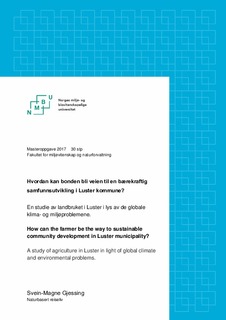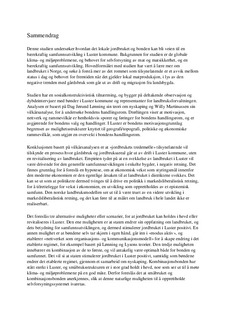| dc.contributor.advisor | Baardsen, Sjur | |
| dc.contributor.author | Gjessing, Svein-Magne | |
| dc.coverage.spatial | Norway | nb_NO |
| dc.date.accessioned | 2017-12-06T14:19:29Z | |
| dc.date.available | 2017-12-06T14:19:29Z | |
| dc.date.issued | 2017 | |
| dc.identifier.uri | http://hdl.handle.net/11250/2469425 | |
| dc.description.abstract | Denne studien undersøker hvordan det lokale jordbruket og bonden kan bli veien til en bærekraftig samfunnsutvikling i Luster kommune. Bakgrunnen for studien er de globale klima- og miljøproblemene, og behovet for selvforsyning av mat og matsikkerhet, og en bærekraftig samfunnsutvikling. Hovedformålet med studien har vært å lære mer om landbruket i Norge, og søke å forstå mer av det rommet som tilsynelatende er et avvik mellom status i dag og behovet for fremtiden når det gjelder lokal matproduksjon, i lys av den negative trenden med gårdsbruk som går ut av drift og migrasjon fra landsbygda.
Studien har en sosialkonstruktivistisk tilnærming, og bygger på deltakende observasjon og dybdeintervjuer med bønder i Luster kommune og representanter for landbruksforvaltningen. Analysen er basert på Dag Jørund Lønning sin teori om nyskaping og Willy Martinussen sin vilkårsanalyse, for å undersøke bondens handlingsrom. Drøftingen viser at motivasjon, nettverk og rammevilkår er henholdsvis sporer og føringer for bondens handlingsrom, og er avgjørende for bondens valg og handlinger. I Luster er bondens motivasjonsgrunnlag begrenset av mulighetsstrukturer knyttet til geografi/topografi, politiske og økonomiske rammevilkår, som utgjør en overvekt i bondens handlingsrom.
Konklusjonen basert på vilkårsanalysen er at «jordbrukets tredemølle» tilsynelatende vil tilskynde en prosess hvor gårdsbruk og jordbruksareal går ut av drift i Luster kommune, uten en revitalisering av landbruket. Empirien tyder på at en svekkelse av landbruket i Luster vil være drivende for den generelle samfunnsutviklingen i enkelte bygder, i negativ retning. Det finnes grunnlag for å foreslå en hypotese, om at økonomisk vekst som styringsmål innenfor den moderne økonomien er den egentlige årsaken til at landbruket i distriktene svekkes. Det kan se ut som at politikere dermed tvinges til å drive en politikk i markedsliberalistisk retning, for å tilrettelegge for vekst i økonomien, en utvikling som opprettholdes av et epistemisk samfunn. Den norske landbruksmodellen ser ut til å være truet av en videre utvikling i markedsliberalistisk retning, og det kan føre til at målet om landbruk i hele landet ikke er realiserbart.
Det foreslås tre alternative muligheter eller scenarier, for at jordbruket kan holdes i hevd eller revitaliseres i Luster. Den ene muligheten er at staten endrer sin oppfatning om landbruket, og dets betydning for samfunnsutviklingen, og dermed stimulerer jordbruket i Luster positivt. En annen mulighet er at bøndene selv tar skjeen i egen hånd, går inn i «modus aktiv», og etablerer «nettverket som organisasjons- og kommunikasjonsmodell» for å skape endring i det etablerte regimet, for eksempel basert på Lønning og Lysons teorier. Den tredje muligheten innebærer en kombinasjon av de to første, og vil antakelig være optimalt både for bonden og samfunnet. Det vil si at staten stimulerer jordbruket i Luster positivt, samtidig som bøndene endrer det etablerte regimet, gjennom et samarbeid om nyskaping. Kombinasjonsbonden har stått sterkt i Luster, og småbruksstrukturen er i stor grad holdt i hevd, noe som ser ut til å møte klima- og miljøproblemene på en god måte. Derfor foreslås det at småbruket og kombinasjonsbonden anerkjennes, slik at denne naturlige muligheten til å opprettholde selvforsyningssystemet ivaretas. | nb_NO |
| dc.description.abstract | This study investigates how the local agriculture and the farmer can be the way to sustainable community development in Luster municipality. The global climate and environmental problems, and our need of self-sufficiency of food and food safety, and sustainable community development, constitutes the background of the study. The main objective has been to learn more about agriculture in Norway, and seek to understand more of an issue which apparently is a deviation between today's status and the need for the future in terms of local food production, in view of the negative trend of farms that are running out of operation and migration from rural areas.
The study has a social constructivist approach, based on participatory observation and in-depth interviews with farmers in Luster municipality and representatives of the agricultural management. The analysis is based on Dag Jørund Lønning’s theory of innovation and Willy Martinussen’s conditions analysis, to investigate the farmer’s choices of action. The discussion shows that motivation, network and framework conditions are traces and guidelines for the farmer, and are decisive for the farmer’s choices and actions. In Luster, the farmer’s motivation base is limited by opportunity structures related to geography / topography, political and economic framework conditions, which constitute the limits of the farmer’s choices of action.
The conclusion based on the conditions analysis is that the “agricultural treadmill” apparently will encourage a process where farms and farmland go out of service in Luster municipality, unless the agriculture is revitalized. Empirical evidence suggests that a weakening of agriculture in Luster will be driving the general societal development in some rural areas, in a negative direction. There are grounds for proposing a hypothesis that the real cause of the weakening of the agriculture in rural districts is economic growth as a steering objective within the modern economy. Consequently, it may seem that politicians are forced to pursue a policy in a market-liberal direction to facilitate growth in the economy, a development maintained by an epistemic community. The Norwegian agricultural model appears to be under threat of further development in a market-liberal direction, and the goal of agriculture throughout the country may not be realizable.
Three alternatives or scenarios are suggested for agriculture to be maintained or revitalized in Luster. One possibility is that the state changes its perception of agriculture and its importance to the community development, thereby stimulating agriculture in Luster positively. Another possibility is that the farmers themselves enter into "active mode", and establish “the network as organizational and communication model” to create change in the established regime, for example based on theories of “Lønning” and “Lyson”. The third possibility involves a combination of the first two, and will probably be optimal for both the farmer and the community. That is, the state stimulates agriculture in Luster positively, while the farmers change the established regime through cooperation on innovation. Part time farming has been a tradition in Luster, and the small-scale farming structure has been largely maintained, which seem to meet the climate and environmental problems in a good way. Therefore, it is proposed that the small-scale and part time farming should be recognized so that this natural opportunity to maintain the self-sufficiency system is safeguarded. | nb_NO |
| dc.language.iso | nob | nb_NO |
| dc.publisher | Norwegian University of Life Sciences, Ås | nb_NO |
| dc.rights | Attribution-NonCommercial-NoDerivatives 4.0 Internasjonal | * |
| dc.rights.uri | http://creativecommons.org/licenses/by-nc-nd/4.0/deed.no | * |
| dc.subject | sustainable development | nb_NO |
| dc.subject | nature based tourism | nb_NO |
| dc.subject | agriculture | nb_NO |
| dc.title | Hvordan kan bonden bli veien til en bærekraftig samfunnsutvikling i Luster kommune? En studie av landbruket i Luster i lys av de globale klima- og miljøproblemene. | nb_NO |
| dc.title.alternative | How can the farmer be the way to sustainable community development in Luster municipality? A study of agriculture in Luster in light of global climate and environmental problems. | nb_NO |
| dc.type | Master thesis | nb_NO |
| dc.description.version | submittedVersion | nb_NO |
| dc.subject.nsi | VDP::Samfunnsvitenskap: 200 | nb_NO |
| dc.source.pagenumber | 88 | nb_NO |
| dc.description.localcode | M-REIS | nb_NO |


